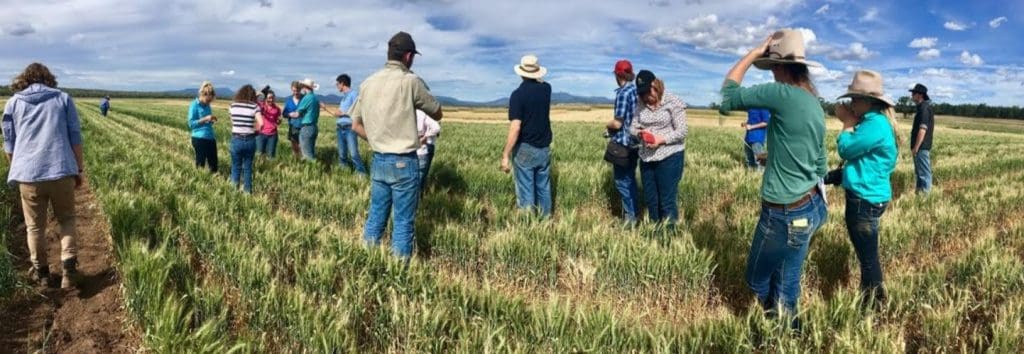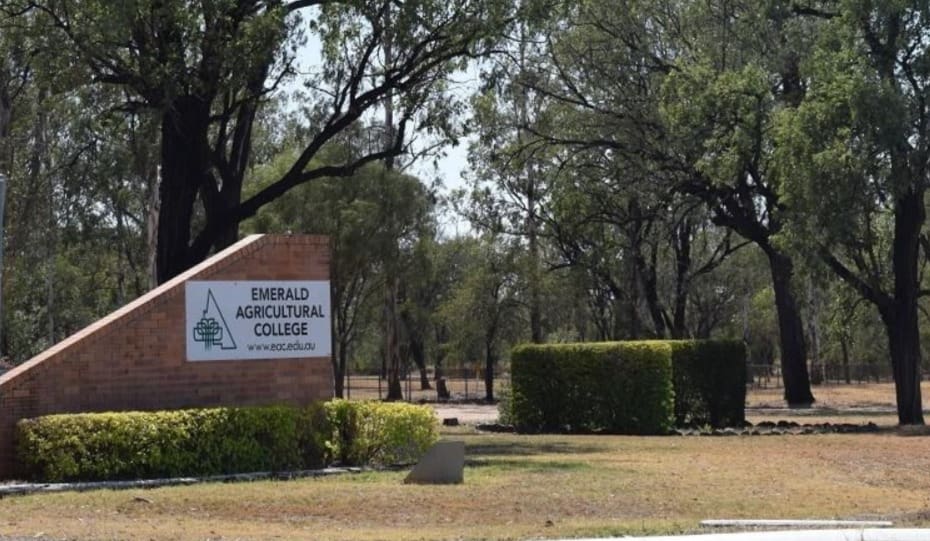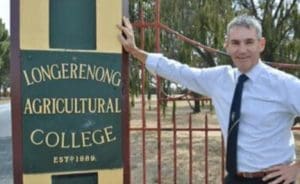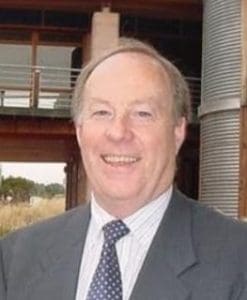 THE model of residential-based agricultural education, which was the preferred training option for budding young farmers for much of the 20th century, is under threat across Australia.
THE model of residential-based agricultural education, which was the preferred training option for budding young farmers for much of the 20th century, is under threat across Australia.
The impact is being felt particularly at the vocational education and training (VET) level which has traditionally filled the role of equipping young secondary school-leavers with the knowledge and practical skills for careers in agriculture.
But the high cost of providing residential agricultural training, a lack of strong policy support from government, the increasing automation of agriculture and dwindling student numbers have been eroding the VET model.
A number of iconic residential colleges have closed or been absorbed into other institutions over the years. Adding to the attrition, another two in Queensland will cease operations in December – the Longreach Pastoral College, which opened in 1967, and the Emerald Agricultural College, which was established in 1972.

The Coaldrake review into Queensland agricultural colleges in 2018 sounded their death knell, finding the challenges facing the vocational sector had multiplied over the years and the training model offered by the colleges was unsustainable.
“The situation with enrolments and completions at the two residential colleges is stark, with a mere 25 students commencing at Longreach in 2018 and 48 in Emerald, down from 37 and 85 respectively, two years earlier,” the review said.
“Thirty years ago these colleges were a first choice for most of the students who enrolled, and for their parents. The colleges provided, in effect, an important transitioning experience between secondary school and adult working life on the land. This characterisation is no longer anywhere near as apt.
“It is anticipated that any gaps in agricultural training will be filled by a range of public and private registered training organisations, particularly TAFE Queensland and Central Queensland University.”
Lack of policy support – Archer

Former Tocal College principal Dr Cameron Archer
Primary Industries Education Foundation Australia (PIEFA) chair and former principal of Tocal College at Paterson in New South Wales from 1987 until 2015, Dr Cameron Archer, said the vocational sector in agricultural education reflected the wider malaise of vocational education and training in general in Australia.
“There is no consistent national policy which can be articulated into state policies for the delivery of VET, nor the support of students attending VET courses,” he said.
“It seems we go from knee-jerk to knee-jerk decisions by governments. Neither side of politics has a consistent and effective policy, which is unfortunate because education is a long term game. To build up educational expertise, effective educational resources and, most importantly, human capital networks for education takes a long time. It is not like opening and closing a gold mine or opening and closing a pizza shop. It is the exact opposite.
“What has happened is that every time there has been change and reform, there has been a diminution of VET.”
Dr Archer said a big impact on the education sector’s capacity to attract enrolments was that agricultural industries had been undergoing enormous structural change.
“We are continuing to replace people with machines on farms and the number of people in rural areas seeking training has become smaller. That means we have very thin markets,” he said.
Cost and compliance challenges
Dr Archer said the high cost of delivering residential-based courses and the growing demands of course accreditation and safety compliance were significant challenges.
“Agriculture is a tough area to teach and train in because it is expensive and not attractive for institutions to do because people are using equipment and working with animals in unpredictable situations in varying climatic conditions. It often tends to be placed in the too-hard basket for institutions,” he said.
“Work health and safety issues are all important, but when it comes to training novices it is even more challenging.
“So, there is a reluctance of institutions to get too involved in the more risky areas which are really important if the industry and government wish to reduce fatalities and injuries,” Dr Archer said.
“They are the areas people need training in, but there is a natural reluctance by training organisations to go there because of the inherent risks.
“The current drought makes it even harder because it is less attractive for people to go into,” he said.
“Also, the cost of people going into courses and pay up front, whereas if they go to university they just put it on the slate.
“The support for students to do VET courses has been very poor,” Dr Archer said.
“Governments have seen it as a private good thing where students have to pay and contribute. Many VET students come from lower income families. It all works against them.”
Dr Archer said the inability of the VET sector to promote the opportunities of agriculture and the benefits of an agricultural education to secondary school students was one of the reasons ag colleges were finding it difficult to attract students.
“Much of the profession ignores the whole issue of schools to their detriment.
“At PIEFA we are looking at encouraging greater learning about food and fibre production in schools from kindergarten to Year 12,” he said.
“We are also encouraging students to consider a career in primary industries at VET or university level.
“There are a lot of ways we need to start working with young people to get them interested in agriculture so that we aren’t even worse off in 10 to 20 years’ time.”
Tocal sticks with full-time, live-in role

Tocal College principal Darren Bayley.
Like the remaining ag colleges still operating in Australia, Tocal has had to adapt to meet the changing times.
Tocal College principal, Darren Bayley, said the college was very aware of the challenges facing residential agricultural training.
“We have watched with interest how in New Zealand we have seen Taratahi (Agricultural Training Centre at Wairarapa) and Telford (agricultural training facility in South Otago), which were the two power-house agricultural colleges in New Zealand, enter into some strife.
“They joined forces a while back and went into administration/caretaker mode,” he said.
“We have watched the changes in Queensland with governance structures over recent years, and now the closure of the ag colleges.
“We have looked at why that occurred and the lessons to be gained.”
But, far from turning away from the full-time, residential model, Mr Bayley said the strategy at Tocal over a long period had been to continue with residential ag training “because we think it is more important than ever”.
“In the 1960s, 1970s and 1980s we largely had people coming off farms.
“It was about getting away from the farm, grow up a bit and get some extra skills and ideas, then come back to the farm,” he said.
“The difference now is that to have the workforce we need for the future we need people that aren’t off farms.
“As farms get larger and there are fewer people coming off them, we will really need people who come from non-farming backgrounds,” Mr Bayley said.
“So residential college has become more important than ever because there are people coming with very limited experience of commercial agriculture, and they need an environment that is going to intensively develop their skills in a safe environment on a commercial platform.”
Mr Bayley said the college’s 2200-hectare, commercial farm was a crucial asset for running the full- time program.
“In a controlled way we slowly get students more involved in our commercial operations from when they start the course before we then put them on co-operating farms, then industry placement around Australia.
“The idea is graduated exposure in a safe and controlled manner to make sure they have the skills they need,” he said.
He said that while residential training was not a cheap form of education, it was particularly valuable for providing the hands-on training and skills to meet the workforce needs of the future.
“The safety record in agriculture needs to improve and we don’t want to put the risk onto industry of having people with very little background, awareness and skills,” Mr Bayley said.
“We are developing a skilled operator, but they don’t come to us that way; we are building them from the ground up.
“There is a view that residential training is a relic of the past. But it has come full circle now and I think it is really crucial for the future.”
Mr Bayley said while full-time residential training continued to be an important part of Tocal’s education offering, the college was not just relying on it and had diversified into a range of different areas.
The full-time residential course component comprises about 35 percent of Tocal’s educational output, but there are also up to 4000 people participating in short courses at 134 locations around NSW with some interstate delivery.
Online programs also contribute to output, as does the publication of about 20,000 agriculture and related books annually. The college also hosts the Tocal Field Days which services the region and beyond.
And the former Murrumbidgee College of Agriculture in the Riverina is now the Yanco Campus of Tocal College.
Longerenong adapts to changing times
Another ag college continuing to serve the farming sector is Longerenong College near Horsham in western Victoria which has also had to reinvent itself to remain viable.

Longerenong head of campus John Goldsmith
Longerenong head of campus, John Goldsmith, who joined the staff in 1990 and has been at the helm for the past 10 years, has seen the college initiate change to move with the times.
“We had higher education training courses for a while, then we were aligned with Melbourne University for 10 years, then in 2006 we were taken over by a not-for-profit group training organisation.
“That turned out to be a great thing for us,” he said.
“We are now dabbling in the international student market
“We have our first small cohort of four this year and are hoping to grow that,” Mr Goldsmith said.
“We are also developing a data farm. We are getting into the ag technology area. We have been allocated $2.5 million from the state government to upgrade equipment and bring in precision ag technology,” he said.
“We will be a go-to place for ag tech in broadacre cropping in Australia. We have to be part of that if we want to be sustainable.”
Mr Goldsmith said there were a number of reasons why there were few ag colleges left in Australia.
“The move away from off-the-job training to more on-the-job has had a big influence.
“We still do some on-the-job training here, particularly in the apprenticeship area. We have stuck to the blended model with apprentices,” he said.
“We bring them into the college for training blocks. Depending on the year group, it can be up to six weeks a year.
“They get to mingle. That socialisation is really important, particularly for some of the young people who are isolated on farms,” he said.
“They make great friendships and spend three years with their peers.”
Mr Goldsmith said one of the biggest constraints on colleges was the high cost of maintaining “bricks and mortar”.
“Maintaining infrastructure is really difficult.
“Competitors with on-the-job training don’t have all the upkeep and maintenance like we do,” he said.
“But we have stuck to our guns. Colleges like us and Tocal now have a niche product in a niche market.
“Our competitive advantage is that we are in the one setting with on-site accommodation, the commercial farm which is really important – I call it the outdoor classroom – and you add together the training side of things along with the social aspect, that’s our product.”
University enrolments for agriculture have surged
While the ag VET sector faces challenges, ag education at university level has staged a resurgence over the past seven years.

Professor Jim Pratley
Charles Sturt University Professor of Agriculture and Australian Council of Deans of Agriculture secretary, Jim Pratley, said university sector agricultural education had evolved and there had been a significant increase in student enrolments.
“From the 1990s to about 2012 it was a downward trend.
“In the late 2000s there was a worry a lot of the universities would go out of agriculture, he said.
“The only thing that kept them in was research income.
“2012 was the bottom and ever since then it has been increase on increase,” he said.
“We now have all the universities in a healthy state in terms of student numbers.”
Professor Pratley said there was also a high level of job placement for graduates from university-level agricultural courses.
“We monitor the job scene in papers and on the internet. It hasn’t changed much in terms of the opportunities.
“We were up as high as seven jobs per graduate. It is now around four jobs per graduate last year,” he said.
“Interestingly, the number of advertisements for people on farms such as farm managers and farm employees has skyrocketed in the last three years.
“I’m not sure why because there is a massive drought over a fair bit of the country, but there is still demand for people with qualifications.”
Commenting on the VET sector, Professor Pratley said it had been a more difficult story for agricultural colleges which had been the primary source of agricultural education in the 1900s.
“Governments have done what they can to emasculate them.
“There was a view it should be able to be outsourced to private operators,” he said.
“So, there are Registered Training Organisations (RTOs), but a lot of charlatans came into that system and basically destroyed it.
The governments haven’t been able to get back to owning it.
“I notice the Federal Government is starting to look at the VET sector again – I’m not sure what that means for agriculture, but we do need the VET sector because a lot of the skills training is not something universities do.”

HAVE YOUR SAY